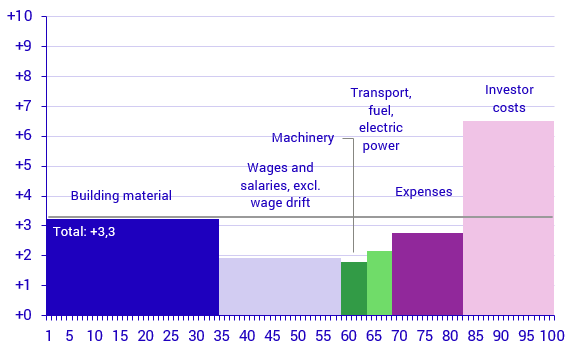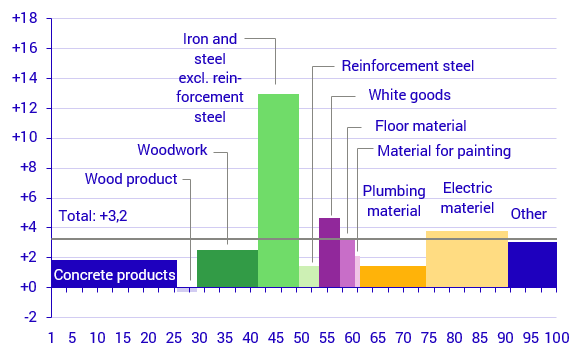Construction Cost Index for buildings, September 2019
Construction costs rose by 3.3 percent in September on an annual basis
Statistical news from Statistics Sweden 2019-10-15 9.30
The Construction Cost Index for multi-dwelling buildings remained unchanged between August and September 2019. On an annual basis, construction costs rose by 3.3 percent in September.
Developments between August and September 2019
The Construction Cost Index for multi-dwelling buildings remained unchanged between August and September 2019. In the corresponding period in 2018, the Index increased by 0.1 percent. Contractors’ costs, which account for more than 82 percent of the Construction Cost Index, increased by 0.1 percent between August and September 2019.
Building material costs decreased by 0.2 percent. In the group ‘building materials’, only the cost of woodwork and white goods rose, by 0.3 percent and 0.1 percent respectively. All other costs in building material groups decreased slightly or remained unchanged. The cost of reinforcement steel and wood products fell most, by 0.8 percent and 0.7 percent respectively.
Contractors’ costs in the group ‘transport, fuel and electricity’ increased by 0.5 percent. This was mostly due to an increase in the cost of diesel oil by 2.2 percent compared with August. The costs of wages and salaries, and machinery costs remained unchanged, while contractors’ other costs decreased by 0.2 percent.
Over the past month, investor costs, which consist of interest and credit costs, costs for plans, and central administration costs increased by 0.4 percent. This increase was due to higher interest expenses.
Developments between September 2018 and September 2019
The Construction Cost Index for multi-dwelling buildings increased by 3.3 percent between September 2018 and September 2019. Contractors’ costs rose by 2.6 percent. This increase in contractors’ costs led to an increase of 2.2 percentage points for the total index in the same period.
Among contractors’ costs, building material costs increased the most, by 3.2 percent. Iron and steel, including reinforcement steel and white goods, accounted for the largest price increases in the building materials group, 8.4 percent and 4.7 percent respectively. Costs in other building material groups also rose, with the exception of the cost of wood products, which decreased by 0.3 percent.
Contractors’ other costs rose by 2.8 percent. Costs in the group ‘transport, fuel and electricity’ increased by 2.2 percent. In this group, the cost of electricity and transport increased by 3.3 percent and 2.2 percent respectively, while the cost of diesel oil remained unchanged.
Wages and salaries and machinery costs rose by 1.9 percent and 1.8 percent respectively.
Investor costs increased by 6.5 percent on an annual basis. This increase was mainly due to higher interest expenses by 22.1 percent.
Construction Cost Index for multi-dwelling buildings, excl. wage drift and value-added tax

The width of the bars represents the production factor’s weight share in percent in the calculation of the Construction Cost Index for multi-dwelling buildings. The height of the bars represents the average price development of each production factor.
Goods |
Change in percent |
||
|---|---|---|---|
| September 2019– August 2019 |
September 2019– September 2018 |
||
Iron and steel* |
-0.3 | +8.4 | |
White goods |
+0.1 | +4.7 | |
Electric material |
-0.2 | +3.8 | |
Floor material |
-0.2 | +3.2 | |
Other building materials** |
-0.4 | +3.1 | |
Woodwork |
+0.3 | +2.5 | |
Material for painting |
+0.0 | +2.1 | |
Concrete products |
-0.3 | +1.8 | |
Reinforcement steel |
-0.8 | +1.5 | |
Plumbing material |
+0.0 | +1.4 | |
Wood products |
-0.7 | -0.3 | |
Total building materials |
-0.2 | +3.2 | |
* Includes reinforcement steel. ** Includes materials for thermal insulation, garbage equipment, gypsum and wood-based boards.
Construction Cost Index for multi-dwelling buildings, excl. VAT

The width of the bars represents the construction material group’s weight share in percent of all construction material in the calculation of the Construction Cost Index for multi-dwelling buildings. The height of the bars represents the average price development of each product category.
Next publishing will be
2019-11-15 at 9:30.
Statistical Database
More information is available in the Statistical Database
Feel free to use the facts from this statistical news but remember to state Source: Statistics Sweden.
